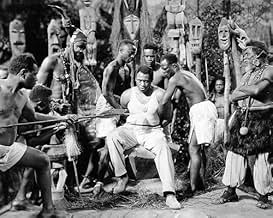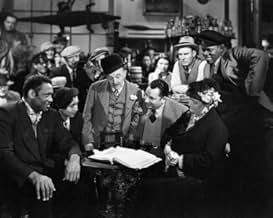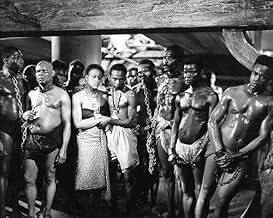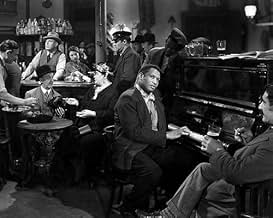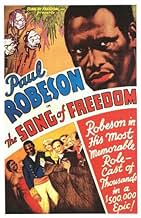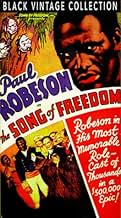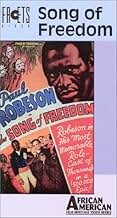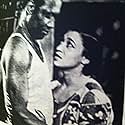A black British dockworker named Johnny Zinga becomes a famous singer and learns that he is the rightful king of the African island of Casanga.A black British dockworker named Johnny Zinga becomes a famous singer and learns that he is the rightful king of the African island of Casanga.A black British dockworker named Johnny Zinga becomes a famous singer and learns that he is the rightful king of the African island of Casanga.
Elisabeth Welch
- Ruth Zinga
- (as Elizabeth Welch)
Bernard Ansell
- Sir James Pyrie
- (as Bernerd Ansell)
Cornelia Smith
- Queen Zinga
- (as Miss C. Smith)
Sydney Benson
- Gate-Keeper
- (uncredited)
Cathleen Cavanagh
- Woman
- (uncredited)
Alf Goddard
- Alf, the Bartender
- (uncredited)
Featured reviews
Greetings And Salutations, and welcome to my review of Song Of Freedom. Before we get into it, here are my ratings:
Story - 1.50 Direction - 1.25 Pace - 1.25 Acting - 1.25 Enjoyment - 1.25
TOTAL - 6.5 out of 10
Song Of Freedom surprised me by putting a smile on my face and a warmth in my heart. For a 1936 film about one African man's dream to find himself and help his people, I wasn't expecting much. Blissfully, I received so much more. The story is well written, intelligent, and finely structured. And not only does it address a couple of major issues it did so at a time other writers, directors, and producers would have steered clear of the subject matter. For one, it's the story of a black man, and Paul Robeson plays the part of John Zinga perfectly. Though it's not only this issue that's highlighted. John has a wife, Ruth, who is portrayed forcefully by Elisabeth Welch. Ruth is a powerful outspoken woman who speaks her mind. In 1936 this was pretty much unheard of, a strong female lead. And, she is a lead. Ruth, being finely constructed, works superbly alongside her husband, John. When they are on the screen together, they demand your attention. It's an ideal pairing of an actor and actress with their characters.
But my delight didn't stop there. The director does an admirable job in putting the tale onto celluloid. Even the stock shots of crowded theatres fit in the movie without drawing undue thoughts. He uses light and shade sublimely to build the tension and unease, especially in the night sequences and imprisonment scenes. But don't get me wrong, it's not perfect. As was the standard back then, whenever there was a chase scene - in Song it's on foot at the start - they speed the film up, giving the segment a Keystone Cops feel, which is terrible. However, it's only a slight thing, so it's easy to accept it and still enjoy the picture.
But, by and far, one of the most pleasurable things about Song Of Freedom is the cast. These actors and actresses are brilliant, and there are no small parts. In one scene, John has invited one of his dockworking buddies to watch his on-stage performance as he's made it as a famous singer. He's talking to him and his wife when he's interrupted by a Lord who may know the secret to the mysterious song that John keeps singing. The dockworker and his wife depart, but not before doffing his cap to the lord and giving an awkward curtsey - the look on the wife's face is outstanding. These trivial elements add depth and believability to the film.
Though I'm not a great fan of musicals, Song is not a typical musical. The music is not integrated into the telling of the story. The music is there because John Zinga is a singer. And a bloody good one at that. Though I will say, Robeson does sound better at acapella than with accompaniment. I would highly recommend Song Of Freedom to anyone who enjoys this style of drama. I thoroughly enjoyed it and will be revisiting it soon.
Please feel free to visit my Dramatisation Of Life to see where I ranked Song Of Freedom.
Take Care & Stay Well.
Story - 1.50 Direction - 1.25 Pace - 1.25 Acting - 1.25 Enjoyment - 1.25
TOTAL - 6.5 out of 10
Song Of Freedom surprised me by putting a smile on my face and a warmth in my heart. For a 1936 film about one African man's dream to find himself and help his people, I wasn't expecting much. Blissfully, I received so much more. The story is well written, intelligent, and finely structured. And not only does it address a couple of major issues it did so at a time other writers, directors, and producers would have steered clear of the subject matter. For one, it's the story of a black man, and Paul Robeson plays the part of John Zinga perfectly. Though it's not only this issue that's highlighted. John has a wife, Ruth, who is portrayed forcefully by Elisabeth Welch. Ruth is a powerful outspoken woman who speaks her mind. In 1936 this was pretty much unheard of, a strong female lead. And, she is a lead. Ruth, being finely constructed, works superbly alongside her husband, John. When they are on the screen together, they demand your attention. It's an ideal pairing of an actor and actress with their characters.
But my delight didn't stop there. The director does an admirable job in putting the tale onto celluloid. Even the stock shots of crowded theatres fit in the movie without drawing undue thoughts. He uses light and shade sublimely to build the tension and unease, especially in the night sequences and imprisonment scenes. But don't get me wrong, it's not perfect. As was the standard back then, whenever there was a chase scene - in Song it's on foot at the start - they speed the film up, giving the segment a Keystone Cops feel, which is terrible. However, it's only a slight thing, so it's easy to accept it and still enjoy the picture.
But, by and far, one of the most pleasurable things about Song Of Freedom is the cast. These actors and actresses are brilliant, and there are no small parts. In one scene, John has invited one of his dockworking buddies to watch his on-stage performance as he's made it as a famous singer. He's talking to him and his wife when he's interrupted by a Lord who may know the secret to the mysterious song that John keeps singing. The dockworker and his wife depart, but not before doffing his cap to the lord and giving an awkward curtsey - the look on the wife's face is outstanding. These trivial elements add depth and believability to the film.
Though I'm not a great fan of musicals, Song is not a typical musical. The music is not integrated into the telling of the story. The music is there because John Zinga is a singer. And a bloody good one at that. Though I will say, Robeson does sound better at acapella than with accompaniment. I would highly recommend Song Of Freedom to anyone who enjoys this style of drama. I thoroughly enjoyed it and will be revisiting it soon.
Please feel free to visit my Dramatisation Of Life to see where I ranked Song Of Freedom.
Take Care & Stay Well.
This was a fairly good film dating back to 1936 from Hammer Productions in Britain. Starring Paul Robeson, whose extraordinary vocal talents are properly utilized. It's the story of a African-Briton living in England after slavery has been abolished in the European nation. He works on the docks and his one dream in life to discover his ancestry in Africa. His interest is fueled by a song that he sings often, be it to his wife or during his job on the docks. A song that he never learned, but as he would put it, was always inside of him. His amazing bass singing voice is over-heard by a theater yuppie and he is quickly recruited to the stage appearing in theatrical productions while utilizing his singing talents. After creating a fan following and with the help of some knowledge from a theater-goer, he decides to finally take the trip to Africa to find his "roots." Overall, the film is good, if not a bit too idealistic. But it doesn't harm the film's integrity and Robeson's great talent as both an actor and singer. Seeing how this film is not known well, I would recommend it. It's not a very long picture; it runs just under and hour and twenty minutes. So take some the time, and find this movie. If not for the film, then do it for Robeson's incredible vocal talents.***
Sure, the movie is dated in both technique and appearance. But it does have the great Paul Robeson in the central role as a dockworker and social equal of his white work mates. This is at a time when Blacks in American movies were reduced to either menials or buffoons. In terms of stereotypes, Robeson's non-demeaning role takes some getting used to. But try imagining that powerful presence and commanding voice in anything other than a dignified role. No wonder he was widely viewed as a threat to Jim Crow stereotypes.
Perhaps the film's most interesting aspect is what the Westernized Robeson can do for his benighted tribe of ancestors once he returns to them, uninvited. Sure, he can bring those sanitation and medical advances that will improve their collective health. The movie does a pretty good job of dramatizing that aspect, and we're all rooting for him to win out over the tribe's non-scientific methods and the witch- doctor power structure keeping them in place. But what happens after that. Of course, the movie stops at that point, so we don't know. But we do know another area of the continent has been opened to Western presence. The question then is whether Robeson will also bring in Western commercial interests, of much more dubious benefit than the proved health benefits, as history shows. After all, penicillin is one thing, Chevron is another. This remains a point to ponder now that the movie has set up the initial stage.
Despite its shortcomings (the outrageously fey Donizetti, for one), the movie remains an interesting artifact of its time, especially for Robeson's and other Blacks' acceptance into the white working class of London's docks. I'm sure the leftist Robeson found that labor- solidarity aspect particularly appealing. Then too, Elisabeth Welch delivers a fine natural performance as Robeson's loyal wife. We root for the two of them just as we would root for a courageous white couple. Above all, however, the film remains a chance to view one of America's noblest forgotten figuresthe great Paul Robeson.
Perhaps the film's most interesting aspect is what the Westernized Robeson can do for his benighted tribe of ancestors once he returns to them, uninvited. Sure, he can bring those sanitation and medical advances that will improve their collective health. The movie does a pretty good job of dramatizing that aspect, and we're all rooting for him to win out over the tribe's non-scientific methods and the witch- doctor power structure keeping them in place. But what happens after that. Of course, the movie stops at that point, so we don't know. But we do know another area of the continent has been opened to Western presence. The question then is whether Robeson will also bring in Western commercial interests, of much more dubious benefit than the proved health benefits, as history shows. After all, penicillin is one thing, Chevron is another. This remains a point to ponder now that the movie has set up the initial stage.
Despite its shortcomings (the outrageously fey Donizetti, for one), the movie remains an interesting artifact of its time, especially for Robeson's and other Blacks' acceptance into the white working class of London's docks. I'm sure the leftist Robeson found that labor- solidarity aspect particularly appealing. Then too, Elisabeth Welch delivers a fine natural performance as Robeson's loyal wife. We root for the two of them just as we would root for a courageous white couple. Above all, however, the film remains a chance to view one of America's noblest forgotten figuresthe great Paul Robeson.
9tavm
In reviewing movies starring people of color in chronological order for Black History Month, we're now in 1936 when singer/actor Paul Robeson has one of his strongest roles yet on film. In this one, he's Johnny Zinga, a London dockworker whose constant singing during break time gets him the attention of impresario Gabriel Donozetti (Esme Percy) who offers him a chance to entertain in various concerts. He becomes successful but something pulls him back to his ancestral homeland in Africa and when someone confirms his heritage, he chucks his career to bring himself and his wife, Ruth (Elisabeth Welch) along with servant Monty (Robert Adams), there to claim his inherited royalty. But the native leader (James Solomon) there doubts him along with the rest of the tribe with the exception of Mandingo (Ecce Homo Toto). I'll stop there and just say this was dramatically satisfying from beginning to end and Robeson really carries the film on his own shoulders whether singing or reciting his lines. Ms. Welch herself has a nice singing voice as shown near the end. Some humor is also appreciated whenever Donozetti teaches some lessons to Johnny and since Monty is the same race as his superiors, his stereotypical antics is not as offensive as it would be with a Caucasian as his boss. So in summation, Song of Freedom is one of the most compelling films in Paul Robeson's career. P.S. One of his numbers is from the operatic version of "The Emperor Jones" as adopted musically by Louis Gruenberg. If you know about Mr. Robeson, you know his previous portrayal in the title role when it was originally a play and then later a movie.
It's sad that this sort of film simply could not have been made in Paul Robeson's home country at the time due to racism. Instead, Robeson went to the UK and made a few films--too few. I say this because he had a wonderful screen presence and his singing was gorgeous.
Robeson plays 'John Zinga'--a London dockworker descended from royalty back in Africa. Oddly, he lacks a British accent (while Robeson was a brilliant and multi-talented man, apparently a British accent was beyond him) and he has a weird sort of consciousness of his people and Africa within him. It goes far deeper than his interest in his cultural homeland--Robeson's character is fixated on the place and seems to have bits and pieces in the back of his mind about his homeland--though no one apparently ever told him about this--at least as far as he can remember. So, after becoming a huge singing star and learning more about the exact place in Africa where his forebears came from, he takes off for the place to get in touch with his roots.
The second portion of the film takes place an Zananga, Africa. There, Robeson is eventually recognized as a descendant of kings and brings culture, medicine and western civilization to these people--but it is a hard fight to get them to abandon their ineffective ways. It's nice that it's NOT a case of whites bringing this to these 'dark' people but a black man bringing this knowledge to them--making it seem a little less paternalistic. In many ways, this portion of the film seems like a call to other black men and women to return and contribute to their ancestral lands.
Overall, while the film might seem a bit old fashioned today, it really is a remarkable film in many ways. The most obvious is because of its unusual subject mater, but more important aspects should not be lost on the viewer. To have a mainstream film starring a strong and talented black man was very progressive for its day. And, seeing Robeson liked and respected by all as a person--even by his white co-workers. In many ways the film comes off as a bit overly ideal--absent is racism and in this film a good black man can achieve practically anything--a message that must have resonated in the black communities in the UK as well as back home in the States. A daring film and a great chance to see and hear an amazingly gifted man. For more on this, read his biography on IMDb--you'll see what I mean.
Robeson plays 'John Zinga'--a London dockworker descended from royalty back in Africa. Oddly, he lacks a British accent (while Robeson was a brilliant and multi-talented man, apparently a British accent was beyond him) and he has a weird sort of consciousness of his people and Africa within him. It goes far deeper than his interest in his cultural homeland--Robeson's character is fixated on the place and seems to have bits and pieces in the back of his mind about his homeland--though no one apparently ever told him about this--at least as far as he can remember. So, after becoming a huge singing star and learning more about the exact place in Africa where his forebears came from, he takes off for the place to get in touch with his roots.
The second portion of the film takes place an Zananga, Africa. There, Robeson is eventually recognized as a descendant of kings and brings culture, medicine and western civilization to these people--but it is a hard fight to get them to abandon their ineffective ways. It's nice that it's NOT a case of whites bringing this to these 'dark' people but a black man bringing this knowledge to them--making it seem a little less paternalistic. In many ways, this portion of the film seems like a call to other black men and women to return and contribute to their ancestral lands.
Overall, while the film might seem a bit old fashioned today, it really is a remarkable film in many ways. The most obvious is because of its unusual subject mater, but more important aspects should not be lost on the viewer. To have a mainstream film starring a strong and talented black man was very progressive for its day. And, seeing Robeson liked and respected by all as a person--even by his white co-workers. In many ways the film comes off as a bit overly ideal--absent is racism and in this film a good black man can achieve practically anything--a message that must have resonated in the black communities in the UK as well as back home in the States. A daring film and a great chance to see and hear an amazingly gifted man. For more on this, read his biography on IMDb--you'll see what I mean.
Did you know
- TriviaPaul Robeson performs a scene from Louis Gruenberg's operatic version of "The Emperor Jones". He earlier had starred in Eugene O'Neill's original play on Broadway (1923) and in the film version The Emperor Jones (1933).
- Quotes
Gabriel Donozetti: What's the matter the color of his skin, when he has color in his voice! Power! Beauty! I go fighting!
- ConnectionsFeatured in That's Black Entertainment (1990)
Details
- Release date
- Country of origin
- Languages
- Also known as
- Un trono por una canción
- Filming locations
- Production company
- See more company credits at IMDbPro
- Runtime
- 1h 20m(80 min)
- Color
- Aspect ratio
- 1.37 : 1
Contribute to this page
Suggest an edit or add missing content

